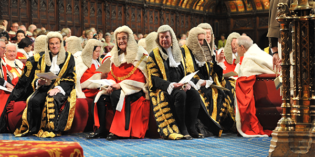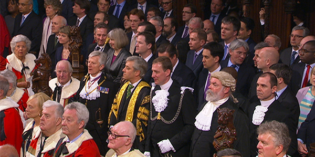
Youthquake 2017: how the rise of young cosmopolitans in Britain could transform politics
In a new book, James Sloam and Matt Henn examine the much-disputed rise in political participation of 18–24 year olds in the UK. They find that the overwhelming majority share a set of cosmopolitan cultural values, which has significant implications for long-term voting patterns and the increasingly entrenched intergenerational politics.

How democratic and effective are the UK’s civil service and public services management systems?
Citizens and civil society have most contact with the administrative apparatus of the UK state, whose operations can powerfully condition life chances and experiences. In an article from our forthcoming book, The UK’s Changing Democracy: The 2018 Democratic Audit, Patrick Dunleavy considers the responsiveness of traditionally dominant civil service headquartered in Whitehall, and the wider administration of key public services, notably the NHS, policing and other administrations in England. Are public managers at all levels of the UK and England accountable enough to citizens, public opinion and elected representatives and legislatures? And how representative of, and in touch with, modern Britain are public bureaucracies?

How democratic and effective are the UK’s core executive and government?
In an article from our forthcoming publication, The UK’s Changing Democracy: The 2018 Democratic Audit, Patrick Dunleavy looks at how well the dominant centre of power in the British state operates – spanning the Prime Minister, Cabinet, Cabinet committees, ministers and critical central departments. How accountable and responsive to Parliament and the public is this ‘core executive’? And how effective are these key centres of decision-making and the rest of Whitehall government, in making policy? Do they consistently serve UK citizens’ interests?

‘How We Vote’: British Columbia faces a complex choice about its electoral system
British Columbia’s voters face their third referendum on reforming the province’s electoral system. Christopher Stafford looks at the choices they face, and notes that the participation (or not) of undecided voters will be key to the result of this postal-vote referendum.

Book Review | Municipal Dreams: The Rise and Fall of Council Housing by John Boughton
In Municipal Dreams: The Rise and Fall of Council Housing, John Boughton offers a compelling and grounded biography of council housing in England, enlivened by his deep familiarity with the developments he describes. While more convinced by the historical analysis than the more polemical aspects of the author’s arguments, John P. Houghton finds the book a worthy addition to understandings of council housing.

How democratic is the UK’s basic constitutional law?
The foundations of any liberal democracy lie with its constitutional arrangements, the key means by which the powers of the state are specified, distributed across different institutions and regulated. Constitutions set out how the state is structured, what its major institutions are, and what basic principles govern their relations with each other and with citizens. In the UK these provisions are famously diverse and uncodified, with no single written ‘constitution’ document. Michael Gordon looks at how to assess the democratic basis of constitutional law, and how well recent experience suggests that the UK has been performing.

Do party leaflets and canvass visits increase voter turnout?
Experiments in the US consistently find that Get Out The Vote campaigns boost participation at election time. Is the same true for Britain? Using a field experiment carried out in cooperation with the Liberal Democrats in May 2017, Joshua Townsley finds that leaflets and canvass visits did boost turnout, but that postal voters were unaffected by campaign contact.

Book Review | The Political Class: Why It Matters Who Our Politicians Are by Peter Allen
In The Political Class: Why It Matters Who Our Politicians Are, Peter Allen lays out the case for and against the dominance of formal politics by a narrow social group – as well as pointing to the ways we could and should change things. Diverse audiences will find much in Allen’s balanced and thoughtful book, recommends Lawrence McKay, which retains an impressive clarity through its engaging style.

Opening up Pandora’s box? How centre-right parties can outperform the radical right on immigration
It is often assumed that populist radical-right parties have dominated European politics throughout the refugee crisis period (2015–18) and laid claim to the immigration issue. James F. Downes, Matthew Loveless and Andrew Lam argue that this narrative is far too simplistic and that incumbent (governing) centre-right parties have responded to the electoral threat of the radical right by highlighting their own anti-immigrant positions. This strategy has helped the centre right to outperform the far right and even offset electoral challenges from them. However, it may also be a double-edged sword that benefits the radical right in the longer term.

How accountable are the UK’s security and intelligence services to Parliament?
For our 2018 Audit of UK Democracy, Sean Kippin and the Democratic Audit team assess the ways in which the UK’s four main security services are scrutinised, to ensure that they are operating legally and in the public interest. For matters that must be kept secret, ‘compromise’ forms of scrutiny have now been developed in Parliament. But how effectively or independently do they work?




 Democratic Audit's core funding is provided by the Joseph Rowntree Charitable Trust. Additional funding is provided by the London School of Economics.
Democratic Audit's core funding is provided by the Joseph Rowntree Charitable Trust. Additional funding is provided by the London School of Economics.